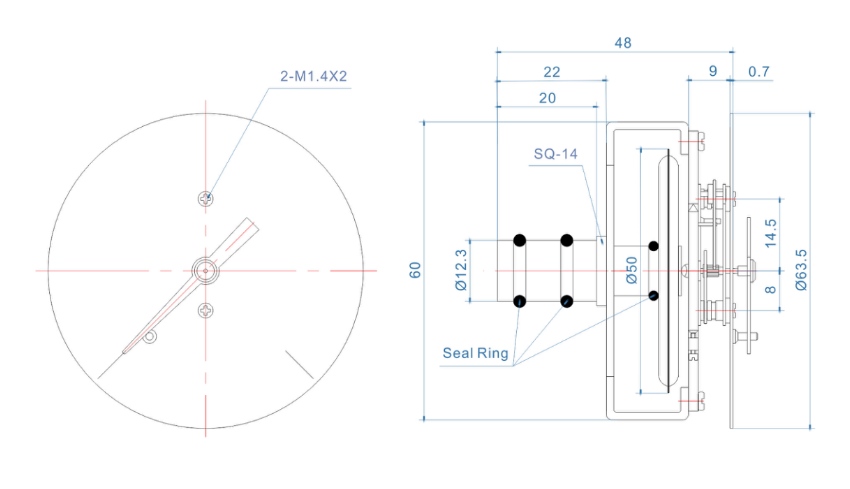
أغسطس . 07, 2024 12:51 Back to list
High Precision Differential Pressure Gauge Models for Accurate Measurement in Various Applications
High-Quality Differential Pressure Gauge An Essential Tool for Various Industries
In many industrial applications, maintaining process control and ensuring system efficiency is crucial. One of the key instruments that facilitate this is the differential pressure gauge. This device plays an integral role in monitoring pressure differences between two points within a system, ensuring optimal operations in various industries such as oil and gas, pharmaceuticals, water treatment, and HVAC systems.
Understanding Differential Pressure Gauges
Differential pressure gauges measure the difference in pressure between two points. This capability is essential for applications such as filter monitoring, level measurements, and airflow assessments. By providing accurate readings, these gauges help operators manage systems effectively and maintain desired performance levels. The need for high-quality gauges arises from the demand for precision and reliability in critical processes.
Importance of Quality
Choosing a high-quality differential pressure gauge can significantly impact the accuracy and reliability of measurements. High-quality gauges are built using durable materials and advanced technology, ensuring longevity and precision. They usually undergo rigorous testing and calibration, which minimizes errors and increases confidence in the readings. Factors such as temperature, humidity, and vibration can affect gauge performance, making the quality of materials and construction a crucial consideration.
Features of High-Quality Differential Pressure Gauges
High-quality differential pressure gauges come with several features that enhance their functionality
1. Accuracy Precision is paramount in pressure measurements. High-quality gauges often have tight tolerances, providing accurate readings that are crucial for process control.
2. Responsive Design High-quality gauges respond quickly to pressure changes, allowing for real-time monitoring and immediate adjustments.
3. Mechanical and Digital Options Analog gauges provide visual readings, while digital versions offer advanced features like data logging and remote monitoring. Many high-quality gauges are available in both formats, catering to different user preferences.
high quality differential pressure gauge type

4. Versatility Many high-quality gauges can be applied across various industries. They are designed to handle a range of pressures and can be adapted for different mediums, including gases and liquids.
5. Robust Construction High-quality gauges are built to withstand harsh environments. They may feature stainless steel casings or other resistant materials to protect against corrosion, pressure fluctuations, and temperature variations.
6. Ease of Installation and Maintenance High-quality differential pressure gauges are generally designed for straightforward installation and require minimal maintenance, enabling operators to focus on their core tasks.
Applications Across Industries
High-quality differential pressure gauges are utilized in numerous applications
- Filtration Systems Monitoring the pressure before and after a filter helps determine when it needs cleaning or replacement, ensuring the efficiency of filtration systems.
- Fluid Level Measurement In tanks or reservoirs, these gauges can indicate fluid levels by measuring the pressure differential between the bottom and the surface of the liquid.
- HVAC Systems In heating and cooling systems, maintaining the correct differential pressure across components ensures efficient operation and comfort.
- Pharmaceutical Production They are critical in ensuring the proper functioning of processes and equipment where precise pressure control can affect product quality.
Conclusion
In conclusion, high-quality differential pressure gauges are indispensable tools in modern industrial settings. Their ability to provide accurate and reliable pressure measurements underpins efficient operations across numerous applications. Investing in a quality gauge is not just about obtaining accurate readings; it is about enhancing system performance, ensuring safety, and optimizing resource management. As technology advances, the evolution of differential pressure gauges will continue to play a pivotal role in supporting industries worldwide, driving improvements in efficiency and safety standards.
-
High-Precision 5 Valve Manifold Differential Pressure Gauge Suppliers
NewsApr.29,2025
-
High-Precision Diaphragm Vacuum Pressure Gauges Manufacturers & Quotes
NewsApr.29,2025
-
Omega Differential Pressure Gauges High Accuracy & Durability
NewsApr.28,2025
-
Low Pressure Differential Pressure Gauges Precision Solutions & Quotes
NewsApr.28,2025
-
Digital Diaphragm Pressure Gaauge Precision Measurement & OEM Quotes
NewsApr.28,2025
-
Differential Pressure Gauge China Price High-Accuracy & Best Quotes
NewsApr.28,2025
